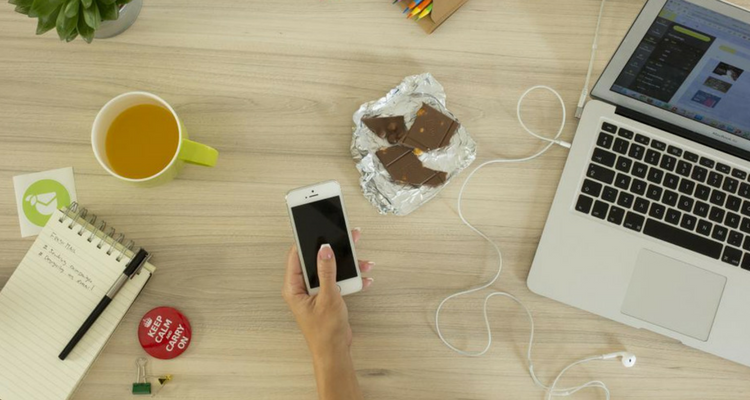This post was originally published on the ViewPoint Cloud blog.
We all do things we know are not good for us. Whether it’s taking a second helping of dessert or staying up an hour later to watch a favorite TV show.
Yet, there are few things as pervasive in modern life as our addiction to email. A 2015 Adobe survey of 400 office workers in the U.S. found the average respondent reported using email more than 6 hours a day, checking email from the bed, car, and even the bathroom.
That may sound shocking, until you think about how that could easily be you, or several of the people you work with.
Constantly checking email seems like a harmless habit, but it can become toxic to our focus and productivity. Here we’ll cover some of the mechanisms that make email so consuming, and how to build habits to make it a more productive tool.
The Cost of Multitasking
For many, checking email is the first thing we do while we’re lying in bed, and the stream continues for the rest of the day.
This wouldn’t be a problem if our brains were computers. Human brains, though, were not designed to continuously flit between multiple activities while maintaining the same level of focus and competence.
As productivity writer, James Clear, explains, multitasking is a myth. While we can technically do multiple things at the same time, we cannot concentrate simultaneously. Every time we start working and then stop to check an email, we break our focus, and it takes time to reset.
“Switching cost is the disruption in performance that we experience when we switch our focus from one area to another. One study, published in the International Journal of Information Management in 2003, found that the typical person checks email once every five minutes and that, on average, it takes 64 seconds to resume the previous task after checking your email,” explains Clear. “In other words, because of email alone, we typically waste one out of every six minutes.”
Constantly checking email has become part of productivity culture. It fortifies our belief that the busier we are, the more we are getting done. In reality, email can be one of our most harmful habits, fragmenting our focus and blurring our priorities.
Why is Email so Addictive?
In her new book, Unsubscribe, Jocelyn Glei describes how checking email is like pulling a slot machine–there’s always a small chance of getting a message you’d actually like to receive! Studies have shown that a random chance of getting that reward is actually more addictive than knowing you will get a reward.
On top of this addictive reward mechanism, email can also make us feel more accomplished than we really deserve to be. Maybe you don’t want to tackle the hardest thing on your plate right now, but you can always check a few emails. Relegating email to this status not only deprives other priorities of careful attention, but it can also make writing and receiving emails–an important task itself–more thoughtless and error-prone.
Still, email remains an integral part of our lives. As Glei described in an interview with NPR, email is like the cockroach of messaging technology–it’s deeply entrenched in our lives with many factors contributing to its survival in a competitive world. It’s not going anywhere anytime soon, so how can we make it better?
What can you do to make email a more productive part of your life?
In a technology inundated world with mediums designed to distract you, it takes active practice not to swept up into the mayhem. To build different habits around email we must first acknowledge a problem with the way we’re doing things now. Secondly, we must set active intentions to practice new behaviors.
Both Glei and Clear offer several active intentions to help us be more productive with email. Here are some of their suggestions, described in detail in Jocelyn Glei’s new book Unsubscribe and James Clear’s Ultimate Guide to Focus and Concentration.
1. Batch process your emails. Set a certain number of times per day to check email, and use that time to exclusively do so (add this to your calendar right now). This way, you’re in the mindset of checking email and process them in batches, rather than picking through them throughout the day.
2. Set benchmarks for long-term projects. One of the reasons email is so addictive is because it gives us a ready source of accomplishment. Break down your larger projects into bite-size pieces so you can tangibly see your progress. This makes it easier to focus on your more meaningful work, and to avoid the temptation of email.
3. Schedule your work around your energy. When do you do your best work? If you focus best in the morning, reserve that time for the most important work of your day. Push off checking email as long as you possibly can. Once people know that you do not respond instantaneously to emails, they will learn to call you or speak in person for urgent matters.
4. Use your devices to your advantage. It’s very hard to build new habits with willpower alone. Set yourself up for success by using your devices in ways that will help you achieve your goals. For example, work offline or in fullscreen mode to minimize outside distractions (this works best with a timing method like the Pomodoro or 52-17 techniques.)
Keep your phone away from spaces where you are most likely to mindlessly check your email (e.g. next to your bed or workspace). And change the settings on your smartphone so it doesn’t automatically check for new mail every few minutes.
5. Keep track of your goals. Clear has written extensively about the effectiveness of goal tracking. If you decide to practice any of the things on this list or other active intentions to build new habits, keep track of your progress. You don’t need to judge how well you do, the simple act of tracking will make you more successful.
Email is a beautiful thing, but it benefits us most in moderation. Keep this in mind, and you’ll likely be off to a much more productive week.





Leave a Reply
You must be logged in to post a comment.